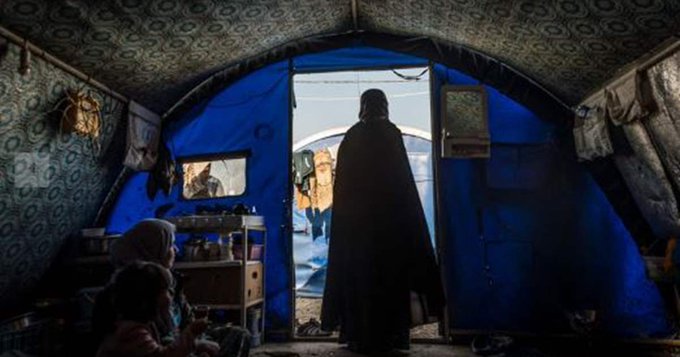“We don’t want them to take him. He’s the only son we have left now.”
Surrounding them both in a semi-circle sat his mother, several of his aunts, and other female relatives. The large family arrived at the camp in August 2017 when it first opened, on the eastern bank of the Tigris River in Ninewa governorate. They have been living there ever since. The decision as to whether they can return home lies with men in their villages.
Khaled’s mother, Nawal*, explained: “In our village there was a meeting. They said our family can never come back. Others who had a Daeshi [family member who joined IS] have been allowed back. They had someone who supported them. We have no one. All our men are either dead, missing or in jail.”
Amnesty International and other organizations have continuously documented the collective punishment of displaced families, especially female-headed families. Many are perceived as supporters of the Islamic State armed group (IS) due to factors outside their control - such as being related, however distantly, to men who were somehow involved with IS - and are ostracized by the rest of society. Such families have reported being forcibly displaced, evicted, arrested, had their homes demolished or looted or faced threats, sexual abuse and harassment, and discrimination after returning to their places of origin.
Today, left in the camps, they continue to face obstacles in accessing identity cards and other official documents. Without these, women are unable to work, move freely or inherit property or pensions, and their children are often unable to attend school or obtain medical care and are at risk of becoming stateless.
This week, media reports stated that the Iraqi parliamentary committee announced that courts are being set up to permit children born under IS rule to obtain official documents granting them their basic rights.
With nearly four million internally displaced people having returned to their areas of origin since the Iraqi authorities’ declared victory over IS and an end to military operations in December 2017, those who remain displaced in camps and informal sites fear they will be left behind – marginalized and ignored – indefinitely.
“People think anybody who is still displaced is a Daeshi family. Like we have a choice in not going back or that we had a choice in anything,” lamented one displaced woman who said she fears harassment and arrest if she returns to her village in Salah al-Din governorate. She explained how they would be at risk of harassment and arrest by armed actors: “They take everyone. Anyone. They take women too. If they close these camps, we will have nowhere to go. No one to protect us. Nobody wants us.”
Nawal, whose husband died in an air strike in Mosul, recently travelled from the camp in Ninewa to the civil status directorate in her home area in Salah al-din governorate to obtain new civil status documentation for her and her children. Her youngest daughter, aged three, has no documents at all. She explained how difficult the authorities make it to obtain such documents saying she feared her older son would be arrested if he was seen by them.
“The authorities basically decide who gets to have a normal life and who doesn’t,” said an international humanitarian worker whose organization provides assistance to families with their legal documentation.
Like hundreds of thousands of families that were caught up in the armed conflict in Iraq against the IS, Khaled’s family and relatives have been displaced several times since leaving their home area in Salah al-Din before being brought to the IDP camp in Ninewa. And like many other families, they lost most, if not all, of their male relatives along the way either to the violence or as a result of arrests by Iraqi and Kurdish forces.
One of the women described how masked armed members of the army grabbed her husband and arrested him calling him a “terrorist leader” during the operations to retake West Mosul: “We had a white cloth the whole time. We walked from neighborhood to neighborhood until we reached the old city. The army came out of nowhere... My girls were all wailing like injured animals after their father. God knows where he is now.”
Another woman told me: “Unless they [village residents] tell us to come back, we’ll be in this camp forever. If they close it, we will have nowhere to go.”
For inhabitants of these camps the future is worrisome and bleak. Iraqi women and children with perceived ties to IS must no longer be punished for crimes they did not commit. Iraqi authorities must put an end to the cycles of mistreatment and marginalization that is resulting in communal violence, by ensuring these families can voluntarily return home without fear of intimidation, arrest or attacks. In the meantime, the Iraqi authorities must protect them from discrimination and grant them access to essential services so that they are allowed to regain a shred of normalcy to their lives.
Nawal looked toward her children and said “If only we know we’d be safe in our village… It’s better for the children that we go back. If we stay here and our children feel rejected and get called “sons of Daeshis” they will become resentful and harbor hate in their heart. That’s dangerous…”
*Names have been changed for security reasons.
Source


 RSS Feed
RSS Feed